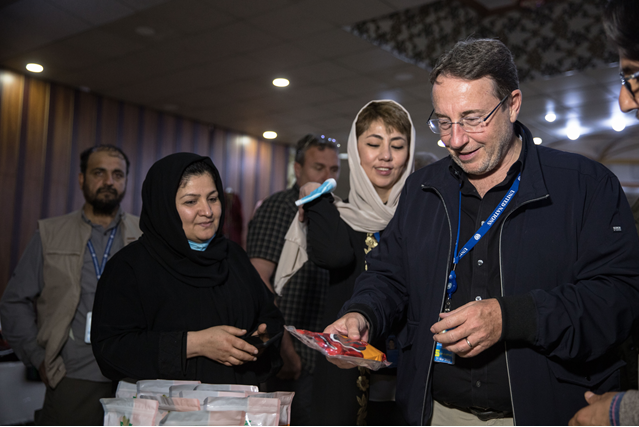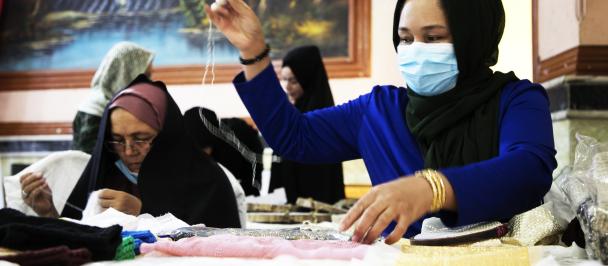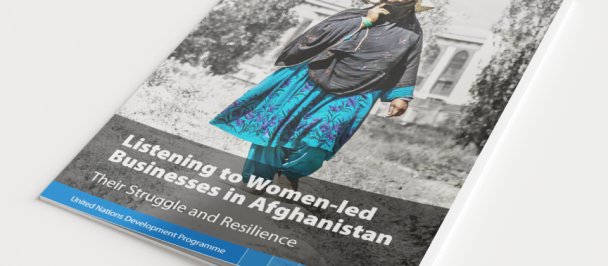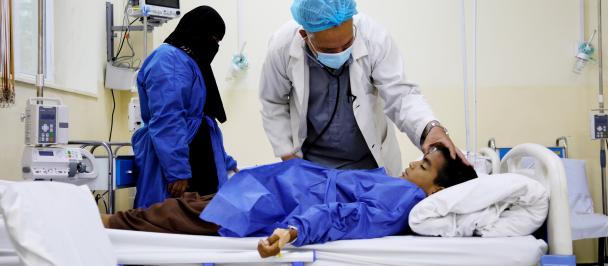UNDP Administrator Achim Steiner and Deputy Resident Representative Surayo Buzurukova at the inauguration of Women’s small and medium-sized enterprises (SME) exhibition in Mazar-e-Sherif.
This year, UNDP Afghanistan focuses on revitalizing the private sector with extra support to women SMEs as enablers of the local community market.
Achim Steiner, UNDP Administrator, calls for reopening of secondary schools for girls, and appeals to the international community for solidarity on the eve of a global pledging conference.
30 March, Kabul | New York – The head of the United Nations Development Programme (UNDP) reminded the international community that Afghans must not be forgotten as the world turns its attention to the war in Ukraine and urged continued investment to save the lives and livelihoods of the Afghan people.
Achim Steiner also stressed the importance of girls’ and women’s rights in the country. Recent decisions to bar girls from secondary education from Grade 6 onwards is of great concern, he said, and UNDP is committed to working with UN agencies to defend and promote girls’ and women’s access to education and work, and to protect these rights.
“UNDP’s partnerships are often multidimensional, and sometimes we are faced with challenges that, like girls’ education in Afghanistan, can become fault lines,” Steiner said. “Both boys and girls must be allowed in the classrooms because the future of Afghanistan must be for all Afghans, not just a selected few. UNDP will continue to help Afghans to create strong socio-economic foundations from which to grow from the ground up.”
Steiner made the comments during a two-day trip to the country where he met with women business owners, academics, civil society representatives, private sector, and decision makers. He also flagged the urgent need for action to prevent spiralling poverty and economic instability.
“We reported late last year that an estimated 97 percent of Afghans could be living in poverty by mid-2022, and regrettably, that number is being reached faster than anticipated,” Steiner said. “And with commodities pricing skyrocketing globally, we know that people here cannot afford to meet their basic human needs like food, healthcare, and education. However, I have witnessed the determination of Afghans to get back on their feet and work for social stability.”
The first stop on his two-day trip was to meet women business owners and members of the Chamber of Commerce in Mazar-e-Sharif. He listened to them discuss the struggles they face in keeping their businesses afloat and the lack of access to capital.
“The women small business owners I spoke with are tenacious in their determination to continue to earn an income and provide for their families and communities against all odds,” Mr Steiner says. “It is vital that the international community shows its solidarity and commitment to preventing further economic hardship, especially for women,” Steiner says. “This year alone, we aim to support more than 50,000 small and medium enterprises, many of which are led by women.”
Following the change in government in August 2021, Afghanistan is facing a potential non-reversable economic collapse, a frozen banking system and liquidity shortage leaving as many as 80 percent of people in debt.
This instability and the need to get cash in the hands of those who need it most, says Steiner, is why the international community must commit to new funding in the upcoming High-level Pledging Event on Supporting the Humanitarian Response in Afghanistan on 31 March.
“We must get the economy back up and running from the ground up, and that means support to individuals, their families and their businesses,” he said. “While the world’s attention is turned to Ukraine and the ripple effect from that war, we must also stand in solidarity with the Afghan people. We will stay and deliver to ensure that hard-fought gains in gender equality, health, livelihoods, and access to energy aren’t lost during this period of hardship.”
On the second day of his tour, Steiner met with NGOs, civil society leaders, private sector leaders, women’s organisations, and academics. He listened to their vision for the future of Afghanistan and the pathways to go forward.
“In building a better future in Afghanistan, the country must retain its thought leaders and young people who are desperate to create the pathways forward in ways that benefit all,” Steiner said. “The very future of the country must be one built upon human rights and dignity, access to livelihoods, and one that leaves no one behind.”
UNDP leads the UN socio-economic recovery in the country under the One-UN Transitional Engagement Framework (TEF). In October 2021, UNDP launched an ambitious local recovery programme, ABADEI, to safeguard livelihoods and small productive activities.
Since then, the ABADEI programme has supported 76,000 people with temporary work; supported 25,000 small farmers and traders with market access, benefiting over a quarter million people; including building vital irrigation systems benefiting 105,000 people, and provided clean and affordable energy access to 18,000 people in poor households and to 80 MSMEs through solar-hydro mini grids.
UNDP has also supported the improvement of health services by helping 3.1 million Afghans - including 1.1 million children and 780,000 women – to access basic medical care including COVID-19 vaccinations, payment of salaries to healthcare workers, and supporting to health facilities.
The creation of a financial mechanism, the Special Trust Fund for Afghanistan, was spearheaded to channel donor funding into a unified response comprising 16 UN agencies ensuring a linked up, cohesive effort to support the basic human needs and essential services in the country.
In addition to the $4.4 billion needed to meet humanitarian needs, UN agencies working in Afghanistan urgently require a further US$3.6 billion to sustain essential social programmes to help 38 million people under the UN’s Framework. UNDP requests US$134.6 million for Afghanistan this year to support its response.
The Administrator acknowledged the financial support already given through the Trust Fund and from bilateral partners, which has helped UNDP to deliver on the ground and contribute to stabilizing livelihoods in Afghanistan, but he said that sustained support and new commitments can further strengthen the potential prosperity of the country.
“I urge international partners to commit to the continued support to the people of Afghanistan in the upcoming pledging conference,” Steiner says. “UNDP is committed to building resilience at the local level, particularly helping women and girls who must not be left behind in the recovery of Afghanistan,” Steiner says. “On the macro-level, we are committed to developing strategies and options to address the virtual collapse of the commercial banking sector and key central banks functions which have paralyzed the financial system and resulted in an unprecedented liquidity crisis.”
About UNDP: UNDP is the leading United Nations organization fighting to end the injustice of poverty, inequality, and climate change. Working with our broad network of experts and partners in 170 countries, we help nations to build integrated, lasting solutions for people and planet. Learn more at undp.org or follow at @UNDP.
For media inquiries, please contact:
In New York: Anna Ortubia | Email: anna.ortubia@undp.org
In Toronto: Lesley Wright | Email: Lesley.wright@undp.org
In Bangkok: Cedric Monteiro | Email: cedric.montiero@undp.org
In Geneva: Sarah Bel | Email: sarah.bel@undp.org

 Locations
Locations



